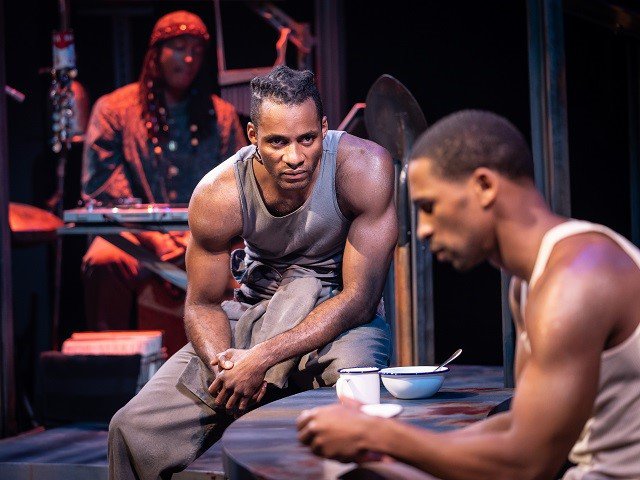[ad_1]

Before Tarell Alvin McCraney was an Academy Award winner, a MacArthur “Genius Grant” recipient, or chair of the Yale playwriting program, he was a student at The Theatre School at DePaul University. While there, he wrote The Brothers Size, based on a two-line Yoruba poem about a man whose brother is missing, so he builds the tools to find him again. This deceptively simple premise is brought vividly to life in American Players Theatre’s production of the play in the indoor Touchstone space (playing through Oct. 8). Under the passionate direction of APT core company member Gavin Lawrence, the extraordinary cast uses poetry, music and movement to explore imprisonment, poverty, centuries of conflict and oppression, family relationships, and the lengths to which a sibling will go to find and protect his brother.
The play begins before the lights go down when The Griot (Jamaque Newberry), an African storyteller, enters the space. His face filled with wonder, he surveys the flexible metal set that has no walls, but often resembles a cage stained with rust (scenic design by Lawrence E. Moten III) Eventually The Griot works his way over to the corner filled with musical instruments that will help him tell his tale — including chimes, a turntable, drums and even bottle caps. For a moment he ponders which story to choose. Reverent, as if handling a holy relic, he gently lifts a shovel up to the sky then sets it down, blade facing the audience. He has settled on the one we need to hear, and feel, and understand. As the story unfolds, it is narrated by the characters, who often speak directly to the audience to reinforce that the performance is part parable.
Then The Griot summons three players who embody the Yoruba spirits Ogun (god of metal and fire), his younger brother Oshoosi (a divine hunter, associated with the human struggle for survival), and Elegba (the guardian of the crossroads of life, also a mischievous spirit who brings chaos while trying to teach humans a lesson). Shirtless, the men come to the stage and perform a percussive step dance as a rhythmic invocation. Powerful and resonant, it is reminiscent of work songs, hymns, and the call and response cadence of soldiers running in training. The spare lyrics are a basic truth for these three Black men in America: “The road is rough.”
When they assume their characters, we first meet the serious, pragmatic Ogun Size (Rasell Holt), who fixes cars during the day at a small garage he owns. At night he is tormented by dreams about the fate and future of his younger brother. Oshoosi Size (Derrick Moore) has just been released from jail and is staying with Ogun while he tries to find his way on the outside. His dreams, remembering his incarceration, are also so troubled he gets little rest.
Oshoosi’s former cellmate, Elegba (Nathan Barlow), tries to lure his friend away from Ogun’s serious lifestyle of early mornings and hard work toward an easier life of endless time off, willing women, and dreamy nights on the Louisiana Bayou. As Ogun and Elegba battle for Oshoosi’s attention and allegiance, the three explode with anger, resentment, jealousy and frustration. They also tell painful stories of the past that inform the present, of lost loves, comically corrupt cops, abandonment, and a system stacked against them from the start. It feels significant that the only time Oshoosi can imagine an optimistic future for himself — education, a good job, travel, a free life — is when he is in a chemically altered state.
Interstitial scenes are flooded in red (lighting design by Michael A. Peterson) and a constant beat, recalling the opening. Sometimes it sounds like running, other times like heavy breathing, or men trying desperately to outrun danger. Each iteration grows more insistent, more urgent, more frantic. This visceral sound design by Josh Schmidt embodies Lawrence’s director’s note: “On a daily basis we live with fear of being murdered or locked up for driving while Black, walking while Black, sitting while Black, standing while Black, talking while Black, running while Black and yes, breathing while Black.”
As Ogun, Holt is clear-eyed, physically imposing and filled with simmering rage. He channels Ogun’s desperation to keep Oshoosi safe — from a broken justice system, his opportunistic friend and his own lack of foresight — into stern ultimatums and the no-excuses tough talk of a parent rather than a sibling. Though their arguments far outnumber scenes lightened by laughter, underneath every line is Ogun’s all-encompassing love for his brother that is demonstrated completely in the play’s final scene.
Moore’s slighter Oshoosi is restless and always in motion. He whines like a true younger sibling and vacillates between teenage-esque rebellion and seeking Ogun’s approval. In Moore’s portrayal, Oshoosi’s swagger is a thin veneer covering both the gullibility of inexperience and the vulnerability of an innocent.
By contrast, Nathan Barlow’s Elegba enters the scene with a sly smile, a head full of impure thoughts and the smoothness of a professional con artist, “drifting like the moon.” Confident, suave and relaxed, he is a sweet talker who tries to wedge himself between the brothers. Elegba even “finds” a car, so Oshoosi can get out from under Ogun’s watchful eye. Like a practiced predator, he bides his time as he lures his unsuspecting prey into a trap.
As the play drives towards a poignant moment of understanding between the brothers, the subtle genius of the set and lighting design work together to deliver one more gut punch for the characters and the audience. Pillars of light behind the house’s metal frame reveal the high walls of yet another prison surrounding them. But instead of deterring the Size brothers, it strengthens their resolve to be free.
With this heart-wrenching production, APT has once again illustrated how to expand its classical canon with an important, riveting, contemporary story of epic struggle and profound love and loss.
[ad_2]
Source link

